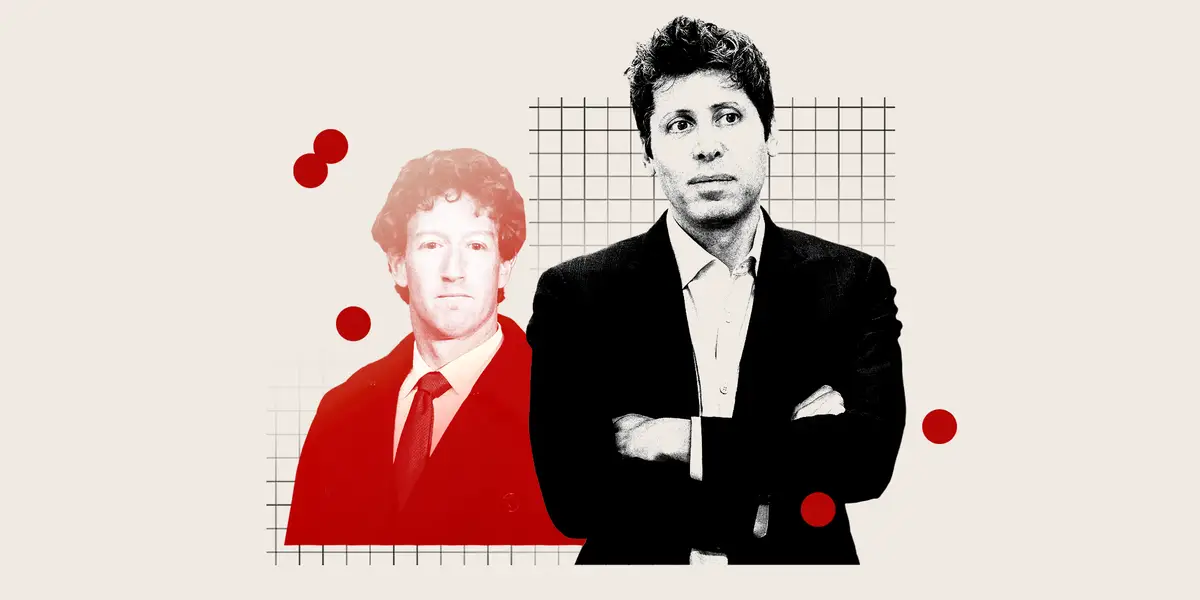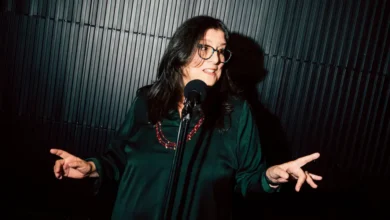Move over, Zuck. Sam Altman is the new global Minister of Thought.

In a 2009 interview, 25-year-old Mark Zuckerberg made a big prognosis about the human condition. “You have an identity,” the Facebook founder said. “The days of having a different image for your friends or co-workers and other people you know are probably coming to an end pretty quickly. Having two identities for yourself is an example of a lack of integrity.”
At the time, its five-year-old social network shaped the identities of more than 350 million people. Like Sergey Brin and Larry Page with their mission to “organize the world’s information” with Google, like Steve Jobs when he put the Internet in our pockets, Zuck was becoming the world’s new Minister of Thought – influencing the way humans thought about themselves and each other when communicating on an unprecedented scale.
Now, 16 years and arguably several identities later (from hoodie-wearing “I’m a CEO, bitch” wunderkind to suit-clad presidential candidate to shirtless MAGA beef fighting jiu jitsu), Zuck is beginning to cede that title to another tech leader shaping human cognition on perhaps an even grander scale, Sam Altman.
ChatGPT, created just three years ago, has more than 800 million weekly users, at least 40 times Facebook’s audience in three years. OpenAI is now the most valuable private company in the world. Ten percent of adults worldwide use its flagship chatbot on a monthly basis – to write emails and browse the web, plan trips, decode medical mysteries or find love.
Where Zuck taught us to publish, Altman teaches us to incite. If the last twenty years were about defining who we are, the next could be about creating who we want to be.
Facebook has reimagined the way we see ourselves and each other. Posts, pokes, photos and likes have assembled a specific digital avatar. Instagram gave us filters. The feed’s ranking systems rewarded the brightest slice of life: latte foam art and dopamine decor. Zuckerberg promised to “bring the world closer together.” He didn’t say we would be unvarnished.
Altman’s world is a generation, not just a presentation. Filters that increase saturation and darken edges have been supplanted by “Ghiblified” photo edits. Sora allows users to turn rough ideas into hyper-realistic videos. I embarked on a fake space opera; Mark Cuban tap danced with the late Ginger Rogers. These tools do not refine reality but write new versions of it.
I saw the call up close. My husband, historically terrible at gift giving, recently pulled it off on my birthday: gold hoop earrings and a Catbird necklace with our daughter’s initial. Her confession – “I used ChatGPT” – was both cute and slightly disorienting. If a robot co-creates intimacy, what else are we outsourcing? Greeting cards, wedding toasts, and homework assignments may be just the beginning.
The office is already there. Studies suggest that generative tools can accelerate knowledge work and improve quality, especially for low performers. The emails became neater, the decks more dazzling. This power also has a disadvantage: more “waste” to sort and lower productivity in the event of misuse.
In the age of social media, we created our identity for the computer. In the age of AI, the computer begins to manage our identity for us.
There’s a bigger platform change behind all of this. Facebook’s feed once redistributed attention outward. Publishers lived and died by referral traffic. The AI returns the model. Large language models ingest the open web and answer queries for it. Where Zuckerberg built a network of people and connections, Altman built a funnel. The user asks, he synthesizes. This convenience is already hitting publishers.
Zuckerberg launched Facebook to connect his Harvard class. Its ambitions have become global. Facebook groups bring together new parents, birders, English learners and Bronies. The company has expanded Internet access in developing countries.
The same algorithms that brought us together have also separated us. Ranking systems fed people more of what they already agreed with, thereby hardening echo chambers. Critics have accused Facebook of fueling conspiracies and “fake news” – around elections, the environment and health.
Altman doesn’t audition like a big community guy. His concerns concern the human-machine connection.
People look to ChatGPT as “a kind of therapist or life coach,” Altman said, a trend he said made him “uncomfortable.” Others fall in love with the chatbot. Soon, a closed adult mode will offer erotica for personalized fantasies on demand. It is the transition from the public square to private rooms.
Early evidence suggests extreme trade-offs. In March, a study from OpenAI and the MIT Media Lab found that ChatGPT increased feelings of loneliness in a group of power users. Last month, the parents of two teenagers who died by suicide after talking to chatbots testified before Congress about the harms of the technology.
Zuckerberg still regulates humanity’s attention; Meta has some 3.5 billion daily active users on its products. He credited the ever-improving algorithms with putting content in front of them that people actually want, increasing the time spent on the company’s apps in the second quarter. Altman moves on to intention, the first – and in some cases last – outline of what we say and do.
Zuckerberg is not ceding the future to Altman. He’s desperately trying to catch up: billions in investments for data centers and chips, meta-superintelligence labs, and aggressive NBA superstar-level bids to poach researchers. In July, Facebook released a new manifesto: “personal superintelligence for everyone,” essentially echoing the line drawn by Altman.
There is an advantage. Co-creation with machines can expand the number of people who can sound crisp, deliver better work, or simply be nicer in group discussion. There is also creep. The more we rely on a model as a first reader and responder, the easier it is to confuse its results with our own thinking.
In the age of social media, we have shaped and curated our identity(ies) for the computer. In the age of AI, the computer is beginning to shape and manage our identities for us.
Melia Russell is a reporter at Business Insider, covering the intersection of law and technology.
Business Insider’s Discourse articles deliver perspectives on today’s most pressing issues, informed by analysis, reporting, and expertise.
ـــــــــــــــــــــــــــــــــــــــــــــــــــــــــــــــــــــــــــــــــــــــــــــــــــــــــــــــــ
Soon, there will be articles covering various topics, such as:
Insurance, Loans, Mortgage, Attorney, Credit, Lawyer, Donate, Degree, Hosting, Claim, Conference Call, Trading, Software, Recovery, Transfer, Gas/Electicity, Classes, Rehab, Treatment, Cord Blood, Best mesothelioma lawyer, Truck accident lawyer, Buy life insurance online, Business VoIP provider, EMR software for clinics, Structured settlement companies, motorcycle injury lawyer, motorcycle injury attorney, spinal cord injury attorney, birth injury attorney, auto accident injury attorney, spinal cord injury lawyer, car injury attorney, motorcycle accident injury attorney, catastrophic injury lawyer, birth injury lawyer, workplace injury attorney, motorcycle injury attorneys, head injury lawyer, personal injury attorneys, traumatic brain injury attorney, train accident lawyer, brain injury attorney, auto injury attorney, serious injury attorney, personal injury lawyer, truck injury lawyer, injury attorneys, back injury lawyer, injury lawyer near me, injury lawyer,
If you would like to see these articles, please write so in the comments.





